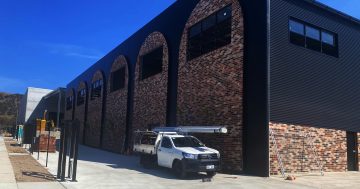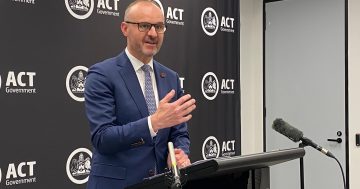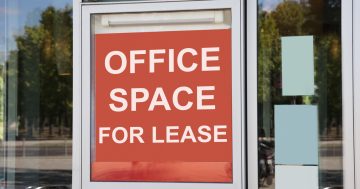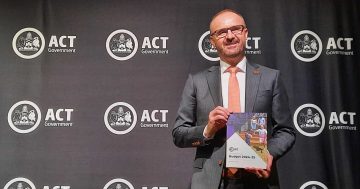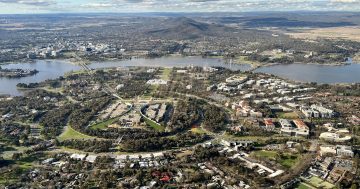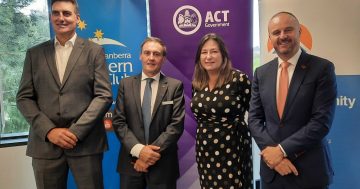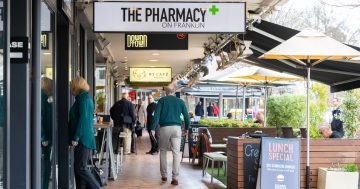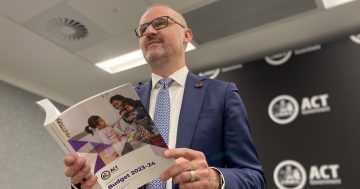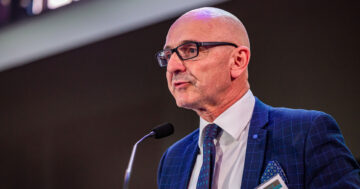
Phillip business owners Brian McLachlan of Phillip Head Services, and Pedders Suspension and Brakes’ Terry Patat discuss their rates bills with President of the Phillip Business Community, Robert Issel. Photos: Ian Bushnell.
Phillip small business owner Terry Patat has a rates message for Chief Minister Andrew Barr – enough is enough.
His commercial rates bill is becoming a crushing burden, with a 76 per cent increase in the past three years enough to make him consider heading across the border after 30 years trading as Pedders Suspension and Brakes in Salamander Court.
In 2016 he paid more than $12,000 in commercial rates, this year the bill is $22,666.72, but the land value has not gone up and Mr Patat can’t see any improvement in services one might expect.
“If anything the services have decreased because the parking around here is impossible. We’re also being targeted by parking inspectors which only compounds the issues,” Mr Patat said.
“I don’t know what the Barr Government is up to but they don’t like us.”
He said the business has absorbed the increases so far but that can’t be sustained, and while no one has been let go “we haven’t been putting anybody on either. So that’s a big problem”.
Asked where he might be in 10 years at the end of the Government’s 20-year tax reform process, Mr Patat said ‘Queanbeyan’, although rates were also rising there.
He said businesses should be compensated at least for the stamp duty they had paid for their premises.
“Canberra used to be a very good place to do business but it’s getting harder,” he said. “In Phillip, it’s almost like they’re trying to move on the automotive sector.”
The situation was not helped by Canberra motorists being slugged with the highest fuel prices and the costs of registration and insurance.

Opposition Leader Alistair Coe with Phillip business owners.
Mr Patat’s case is being taken up by Opposition Leader Alistair Coe, who instigated the Assembly committee inquiry into commercial rates and has identified the discontent as fertile ground for next year’s election.
Having already promised a residential rates freeze, Mr Coe said the situation was unsustainable and a commercial rate freeze was also on the table but was evasive about the cost to the ACT’s own bottom line.
“We’re going to go a long way to be able to fund all the essential services in the ACT by simply making sure that all the growth in the region happens in the ACT,” he said.
He said the tax base needed to be broadened by making the ACT a much friendlier place for people to do business, not by taxing businesses out of existence.
“If we start to encourage growth in the ACT rather than have the growth over the border in NSW we’ll have a much bigger pie than what we currently have,” he said.
He rejected Mr Barr’s claims that the overall tax burden in NSW was greater than that in the ACT, calling them bogus arguments and saying commercial rates in NSW are considerably less than in the ACT.
Mr Coe said many Canberrans felt betrayed on rates. “They said people would hardly notice it, well people are noticing it,” he said.
President of the Phillip Business Community, Robert Issel said the business community was disappointed in the lack of consultation and the way they were being treated.
“They don’t sit down with people at a grassroots level and say what are the issues you’re facing, how can we work with you,” he said. “It’s as if they feel they’ve got a right to take our money but not deliver the services that we should be getting.”
The rate rises were impacting a business’s bottom line and making it hard to sell even if an owner wanted to move on.
“The ACT Government is devaluing commercial properties, devaluing people’s livelihoods and the value of businesses,” Mr Issel said.
The Government has said that it would respond to the findings of the Assembly inquiry that the system was flawed but Mr Issel said he had heard nothing.
“They seem to be moving very quickly to hit us with parking fines but very slowly to hit us with a better outcome for our businesses.”
